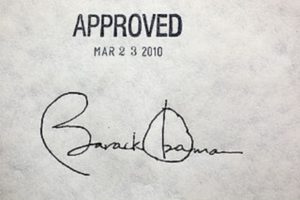
President Obama’s health care signature – Wikimedia Commons
The recent defeat of the American Health Care Act (AHCA) of 2017 — the failed Republican House plan to repeal and replace Obamacare — symbolizes the comeuppance of the GOP. White conservatives built a movement around the vilification of the Affordable Care Act (ACA), giving momentum to the Tea Party. During the Obama years, Republicans in Congress voted to repeal Obama’s hallmark legislation more than 60 times, according to Reuters. Now that the conservative party owns all branches of government, they are still unable to topple Obamacare.
This time, with the failure of Trumpcare — or more aptly Ryancare, named after the House Speaker responsible for this most unpopular piece of legislation, toxic even among his own ranks — the Republicans could not mobilize their soldiers. Simply put, Obamacare is helping too many poor white folks, including those in Appalachia, in West Virginia and elsewhere that are suffering from opioid addiction and voted for Trump in large numbers. While the law is imperfect and could use improvements, this does not negate the fact that it has helped millions. Comedian D.L. Hughley captured this sentiment regarding the GOP failure to repeal the health care law:
“I think that they were successful making people believe that this was all about poor Black people, but it wasn’t. When they saw the faces of the people really affected by Obamacare, I think we learned that people hated the ‘Obama’ part, but the ‘care’ part they were all right with,” Hughley said in a recent interview with TMZ. Hughley noted on his radio show that the bill was doomed from the start, given its 17-percent approval rating in a recent poll. The Quinnipiac University poll also found that 56 percent of voters disapproved of the Republican health care plan. “Here’s what happens when rich white people only listen to rich white people,” he said, noting that none of those pushing the legislation had any experience needing anything from the government. “It’s very wealthy men sitting around deciding what women and less-fortunate people should do with their body and should do with their health care. It was all of them deciding and deeming what was necessary and they thought everybody felt the way they did,” Hughley added.
For the Republican Party, things have come full circle. Once the party of emancipation, Reconstruction and the Freedmen’s Bureau, the GOP has experienced a complete evolution into an anti-government, white nationalist political organization. It all started with the birth of the conservative movement and Sen. Barry Goldwater, who ran for president in 1964 with a pro-small government, anti-civil rights message. Over the years, the Republicans have made the racialization of government programs their bread and butter. Capitalizing on the resentment and anxiety white segregationists felt over the gains of the civil rights movement, the GOP convinced aggrieved Southern Democrats to associate government with helping Black people. Thus began the march of segregationists to the Republican Party. Republican strategist Lee Atwater summed up the Southern Strategy perfectly in 1981, as The New York Times reported:
“You start out in 1954 by saying, ‘N—-r, n—-r, n—-r,’” Atwater SAID. “By 1968, you can’t say ‘n—-r’ — that hurts you. Backfires. So, you say stuff like forced busing, states’ rights, and all that stuff. You’re getting so abstract now [that] you’re talking about cutting taxes and all these things you’re talking about are totally economic things and a byproduct of them is [that] blacks get hurt worse than whites.”
With President Obama, the Southern Strategy took on new meaning for Republicans, as he became the personification of white animus towards Black people. The GOP painted Obamacare, the Black president’s signature accomplishment, as a welfare program, more “free stuff” for Black people. In contrast to the prevailing Republican spin, the ACA is relatively popular and helping millions of Americans who were previously without access to health care.
A recent poll from the Pew Research Center found that 54 percent of Americans approve of Obamacare. In addition, according to a report released by the Council of Economic Advisers last December, 20 million people — or 1 in 7 Americans — across the economic spectrum gained access to health insurance because of Obamacare. The gains in health coverage were the most dramatic since the 1960s decade after Medicare and Medicaid were created, resulting in an uninsured rate below 9 percent — a record low.

King vs. Burwell – Rally in support of Obamacare – US Supreme Court (Flickr)
African-Americans are among those who have benefited from Obamacare. The ACA provided three million previously uninsured Black adults with health insurance, cutting the Black uninsured rate in half. This included more than half a million African-Americans between 19 and 26 who are now covered under their parents’ plans. Also because of the ACA, 15 million Black people with private insurance have access to flu shots, mammograms and cervical cancer screenings with a zero-dollar copay or deductible.
In contrast, the nonpartisan Congressional Budget Office determined the Obamacare replacement would have added 24 million people to the ranks of the uninsured. Although Trump won the white vote, particularly in rural, older white America, Trump voters were poised to lose the most from the Obamacare replacement plan. A Kaiser Family Foundation study found that 6.3 million of the 11.5 million people who bought health insurance through the Obamacare marketplace live in Republican Congressional districts. This is why members of Congress in red states had been bombarded by angry constituents in recent months, angry white voters who demanded that these lawmakers dare not touch their Obamacare, Medicare or Medicaid. Although they tried, Republicans failed to exploit Obamacare and racialize it for political gain, unlike their past successes with welfare, crime, voter ID and affirmative action.
Historically, white voters are notorious for acting against their economic interests for the sake of perceived white-skin solidarity. For example, some whites railed against Obamacare while voicing support for the Affordable Care Act, unaware that the two were one and the same. This time with the ACA repeal that never was, however, Republicans were unable to dupe enough white people with race-card politics. Ultimately, their efforts to conjure up the image of Obamacare as an imminently imploding disaster or a Black welfare program — or both — failed.


